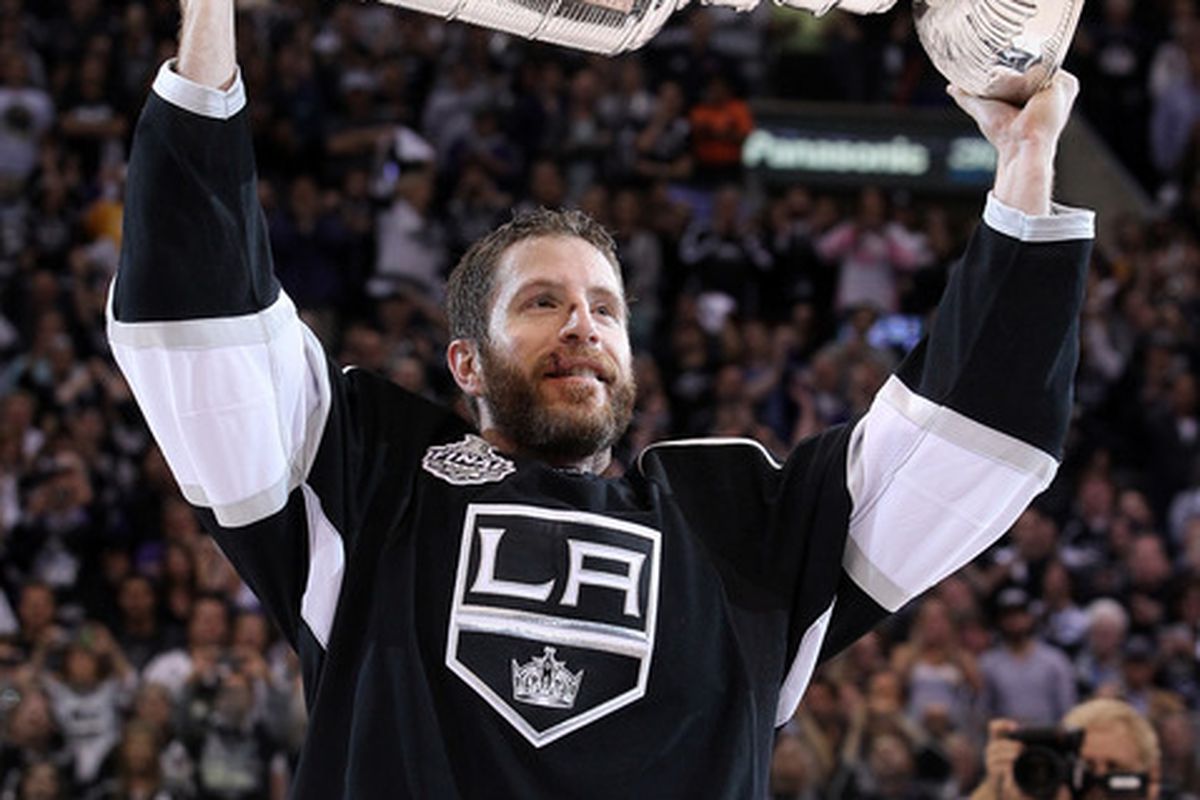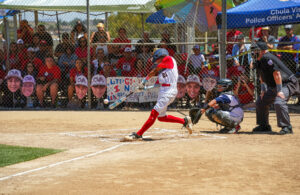How Rob Scuderi’s Fearless Heroism Helped the 2012 LA Kings Achieve Unprecedented Stanley Cup Greatness
- Updated: May 18, 2019

“The Kings need to sign this guy!”
Many times during the 2009 Stanley Cup Final, that sentenced was uttered from this writer’s mouth regarding pending unrestricted free agent, Rob Scuderi.
During said series, Scuderi’s Pittsburgh Penguins were up against the Detroit Red Wings in hopes of avenging their loss to them in the Stanley Cup Final the previous year.
Yet, while the likes of Sidney Crosby, Evgeni Malkin and Marc-Andre Fleury all helped end the Penguins’ 17-year championship drought in 2009, it was the relentless defensive play of Rob Scuderi that helped shut down a vaunted Red Wings offense, which included Henrik Zetterberg, Pavel Datsyuk and Marian Hossa. While being a defensive defenseman didn’t make him the most celebrated or revered player on his team, Scuderi nonetheless showed that he deserved to be credited just as much as his aforementioned star teammates for the Penguins’ Cup win.
That July, though, Scuderi tested the free agent waters and joined a long-suffering team that was suddenly on the rise.
The Los Angeles Kings, already in the midst of establishing themselves as a defensive juggernaut, signed Rob Scuderi that summer, paving the way for his — and his new team’s — future success.
While suggesting who the most influential player was during the Kings’ 2012 run does warrant a lengthy debate, there is no disputing just how integral a role Scuderi played in the Kings’ achieving their Stanley Cup aspirations that spring. The club’s then-assistant coach Jamie Kompon can even attest to this as this writer spoke with him — as well as Scuderi himself — about what the blue-collar blueliner brought to the Kings and the impact he left on the franchise as a result.
The Appeal of L.A.
“My decision to go to Los Angeles was really based on the fact that [the Kings] had a lot of good, young talent and everyone in the league had been kind of looking at them and respecting what they were building,” Scuderi said. “I think the second factor for me is that they really wanted me and, as a free agent, you want to go a place certainly where you’re wanted but also where you’d think you’d fit.”
While the players certainly deserve a great deal of credit, few, if any, can look at the 2012 Kings and imagine their success without the club’s architects: general manager Dean Lombardi and assistant GM Ron Hextall. For Scuderi, it was what the two men wanted from the veteran defenseman that helped him realize that Los Angeles was the right place for him.
“‘We don’t want you to be anything different than what you are.’” recited Scuderi of what Lombardi and Hextall told him in 2009. “There was no need to show up to Los Angeles and, because I had signed a bigger deal than I had, that there became new expectations. They just wanted me to be what I was on the ice and to be a good locker room leader, and I think I delivered on those things.
“It made me much more comfortable to know that they just wanted me to be me. A lot of times when you sign an elevated contract or a bigger contract than you’re used to having, people and media all tack on bigger expectations, and they never said any of that. They just wanted me to be me and I think– I could never be anything else but it certainly took some of the pressure off going to a new team.”
Defense First
Another instrumental part of the Kings’ rise to prominence was found in the aforementioned Jamie Kompon, who is now an associate coach for the Winnipeg Jets.
Kompon, who had joined the Kings shortly following Dean Lombardi’s arrival in 2006, knew that the importance of Scuderi’s signing wasn’t limited to his on-ice contributions.
“His addition really helped solidify Drew Doughty also,” Kompon stated. “It really gave us a solid pairing. He’s got a real good stick, a great penalty-killer — he really thinks on the penalty kill — but defensively, him and Drew were a great combination as a one-two. Rob did his job, Rob knew what to do with the puck, he did the little details to help Drew become a better defensive player. So, it helped calm Drew’s game down and I think it really helped solidify our top pairing.”
While Scuderi was quick to admit that the Kings had more than their share of offensive woes early on, the native of Syosset, N.Y., was just as quick to point out the advantages of the Kings’ defense-first philosophy.
“I felt that when our team was back up against it and it was a real desperate time, I always thought the forwards came through and the guys that needed to come through always delivered,” Scuderi emphasized. “I always felt that was the mark of a strong team: You can step up at the big times and get the job done. So, even though we were a great defensive team, it was our identity that we were responsible and that we played well in our zone, that it was going to be tough to score three on us.”
To suggest that Scuderi had a less-than-glamorous role would be an understatement, even being a tad unfair. For the 12-year NHL veteran, however, there were no complaints as blocking shots and killing penalties was part-and-parcel with what he did on a nightly basis.
“For Rob, that was just part of his DNA,” Kompon said. “Anytime anyone blocks a shot has a big shot block or prevents something with their stick or body, your team gets an emotional lift and there’s a certain amount of excitement. On the bench, everyone gets excited: they’re high-fiving him when he comes off the ice. He didn’t look for accolades in doing it. That’s just who he was. It was part of his game and part of being the pro that he was.”
Springtime is Clutch Time
As reliable as he was during the regular season, though, Scuderi had already proven how clutch he was come playoff time. His fearless play helped lead the Penguins to two-straight Stanley Cup Final appearances and, after helping the Kings return to the playoffs after an eight-year absence, the former Boston College Eagle knew he had to step up his game to help the Kings make that next step.
“In a regular season game, not that you want to make a mistake, but it might be Game 55 and you can kind of make those mistakes as they go. In the playoffs, it gets magnified because a big mistake, a big turnover, something that leads to a goal, could be the difference in a game because there aren’t too many blowouts in the playoffs,” explained Scuderi. “So, every time you have the puck or every time you make a decision, it comes with a little extra pressure: Is this the right play? Is this the right thing at this time? I think whether it’d be a long time ago or today’s game, mistakes are usually what will dictate a game. It’s usually about the mistake you don’t make, not that you want to play cautious or that we did, but when you look back on things, it’s usually what was capitalized on that are the differences in hockey, and I thought that was the biggest difference.”
When critics see a team whose offense finishes next-to-last in the league, it’s easy to dismiss them and their playoff chances. This was the case for the Kings entering the 2012 playoffs. If there were any reasons to worry, though, someone had forgotten to notify Scuderi.
“I didn’t think we changed our identity too much,” Scuderi said of his team entering the 2012 postseason. “I just think it became more magnified once it became playoff time. We were always good at being in positions, relying on each other, blocking shots, having assignments. Those things stay the same but certainly, you feel pressure to elevate your game in the postseason and to rise to the occasion because each play means that much more.”
And rise to the occasion they did.
After dethroning the top regular-season team, the Vancouver Canucks in five games, the Kings then swept the St. Louis Blues before downing the Phoenix Coyotes in five games to earn a spot in the team’s first Stanley Cup Final in 19 years. But, after a promising 3-0 start in their Finals series against the New Jersey Devils, the Kings had lost the next two, leaving some to question whether the now-mortal Kings had anything left in the tank, whether they could avoid an infamous collapse.
Sacrificing for Stanley
Those questions were answered early in Game 6 when Rob Scuderi selflessly took one for the team.
“I can remember the puck going back [behind the Kings’ net] and doing what I had done several times with [Drew] Doughty, who was my partner at the time,” began Scuderi. “Maybe two, three, four times a game where I come in, I circle in to get the puck on his side. I didn’t think I could make it around the net before the forechecker got on me, so I’d reverse it.”
Then came the turning point of the game — and the series.
“I was just trying to do a play we had done several times and I think [Devils forward Steve] Bernier came in with a good forecheck,” Scuderi continued. “I just think he hit me a little higher than he wanted to. If he hit me low around my lower back and hips, your body goes up and your natural tendency is to rise and hit the boards and it would’ve been nothing. Like the other two or three times in the game, I would’ve been able to pull that off. I think in that instance, he hit me just a little high and it caused my upper body to go down and it put my face into the glass.”
Of course, while the play looked vicious, Scuderi wasn’t seriously hurt. Nonetheless, the blueliner laid on the ice while coyly sneaking a peek to the referee to see if he would call a major penalty.
He did.
“I know I got banged pretty hard,” the veteran recalls. “But I just wanted to get up but I certainly felt it a little more than a usual hit. Then, once you have a second or two to calm yourself, I got myself off the ice.”
So, under his own power, Scuderi got up and skated off the ice, unnerved regarding his welfare.
“I wasn’t all that concerned with my immediate health. I knew I was fine,” a confident Scuderi remembers. “But, at that point in time, the trainers have to bring you in for the concussion protocol for a headshot and, at that point, they were looking for stitches, I know I passed the concussion protocol and now you just want to get back out there and help your team.”
While he was certainly looking forward to a long man-advantage, however, Jamie Kompon’s concerns were primarily with Scuderi’s well-being.
“The biggest thing was Rob’s safety and his coming back to that game,” Kompon recalls. “Then knowing right away that he was just getting stitched up and ready to come back, the guys knew that during those five minutes, that was for Rob. They wanted to make sure that they’d make [New] Jersey pay on the power play, for putting Rob in that position and Rob taking that kind of hit to put us on the power play.”
Scuderi’s teammates didn’t waste any time in taking advantage of the power play. The Kings scored three goals during the man-advantage, setting the stage for a decisive 6-1 victory.
“I could hear the rumblings of the STAPLES Center as we scored each goal and that was a great feeling,” Scuderi said in an ill-fated effort to contain his excitement. “But, at the same time, as a competitor, you want to be out there with your team whether on the ice or not.”
Fortunately, Scuderi was able to be out there with his team when it came time to present hockey’s Holy Grail: an accomplishment made possible by the blue-collar Scuderi just as much as the club’s bigger stars, such as Anze Kopitar, Jonathan Quick, and the aforementioned Doughty.
“I know my style was very underrated, extremely below the radar,” admitted Scuderi. “But some of my best memories are from Los Angeles. Even though it was a little bittersweet not to be [with the Kings in 2014], I know that if I couldn’t win [the Stanley Cup], I was happy to see the Kings win it.”
Underrated, maybe, but Scuderi’s aforementioned style has never gone unappreciated, much like his leadership qualities.
“Rob was a very quiet leader,” Jamie Kompon added. “I think he let his actions speak for themselves: how he played, how he carried himself, his professionalism.
“When he did have something to say, to a team, I think it was understood that everyone listened. It was important when you have a leader like that or a veteran player that doesn’t say much to let his actions speak more than his words. It was really important when he had something to say because when he voiced something, guys took it seriously because they knew it was something important coming out of his mouth.”
A Legacy Fit for a King
As part of a Kings’ 2009-10 promo, Rob Scuderi said that he “didn’t come to LA to finish second.”
Rob Scuderi did everything he could, celebrated or not, to live up to those words — and three years later, the Los Angeles Kings earned their way to the top of the proverbial hockey mountain for the first time ever.
“Rob doesn’t get a lot of credit for what he did in terms of– you don’t see it on the penalty kill, you don’t see it on the points, but how he helped Drew Doughty, how he helped settle down our defense corps I think was a real, real big plus for us,” added Kompon. “His presence, his veteran leadership, I think that really came to work, he came to the rink every day to get better and to work. He was a professional who worked hard to get things right. He set an example and I think when you look back, people don’t recognize the kind of impact he did have [on the Kings franchise] but you look at him drawing that five-minute power play. That helped us and propelled us to win the Stanley Cup that night.”
In addition to making this writer look good as an armchair GM, Rob Scuderi made a long-suffering fanbase believe, in spite of so many setbacks prior — unsuccessful rebuilds, for one — that anything and everything is possible and to never, ever give up.
Said philosophy may have even rubbed off on Mr. Kompon who would later be an integral force in his wife Tina’s battle with cancer:
Hockey Fights Cancer important to Jets assistant coach, wife | NHL.com
Rob Scuderi gave it his all in a King’s uniform, played the role the stoic warrior who sacrificed his body and well-being for the sake of his team’s success, wearing the blood he shed as a badge of honor. If what Rob Scuderi stood for on the ice doesn’t inspire hockey fans, or anyone for that matter, too, in the immortal words of Teddy Roosevelt, speak softly and carry a big stick, then no one else will. That is a testament to the legacy Rob Scuderi has left on the Los Angeles Kings… then, now and forever.
Stay with us at Calisportsnews.com as we will keep you up-to-date on all things Los Angeles Kings and the rest of the SoCal sports teams! All Cali, All the time














Lavoy Briscoe
May 20, 2019 at 4:23 pm
Great article, great points, and just an excellent read!